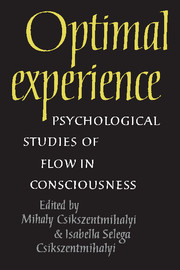Book contents
- Frontmatter
- Contents
- Acknowledgments
- Contributors
- I A THEORETICAL MODEL OF OPTIMAL EXPERIENCE
- II VARIETIES OF THE FLOW EXPERIENCE
- III FLOW AS A WAY OF LIFE
- IV THE MEASUREMENT OF FLOW IN EVERYDAY LIFE
- 15 Introduction to Part IV
- 16 The systematic assessment of flow in daily experience
- 17 The quality of experience in the flow channels: comparison of Italian and U.S. students
- 18 Flow and the quality of experience during work and leisure
- 19 Optimal experience and the uses of talent
- 20 Self-esteem and optimal experience
- 21 Optimal experience and the family context
- 22 The future of flow
- References
- Name index
- Subject index
17 - The quality of experience in the flow channels: comparison of Italian and U.S. students
Published online by Cambridge University Press: 05 June 2012
- Frontmatter
- Contents
- Acknowledgments
- Contributors
- I A THEORETICAL MODEL OF OPTIMAL EXPERIENCE
- II VARIETIES OF THE FLOW EXPERIENCE
- III FLOW AS A WAY OF LIFE
- IV THE MEASUREMENT OF FLOW IN EVERYDAY LIFE
- 15 Introduction to Part IV
- 16 The systematic assessment of flow in daily experience
- 17 The quality of experience in the flow channels: comparison of Italian and U.S. students
- 18 Flow and the quality of experience during work and leisure
- 19 Optimal experience and the uses of talent
- 20 Self-esteem and optimal experience
- 21 Optimal experience and the family context
- 22 The future of flow
- References
- Name index
- Subject index
Summary
This chapter compares responses to the Experience Sampling Method from a sample of American students in the Chicago area studied by Csikszentmihalyi and Larson (1984) and a sample of Italian students from a classical lyceum in Milan (Carli 1986; Gallina 1986; Toscano 1986; Massimini & Carli, Chapter 16). The purpose of the comparison is to ascertain whether and to what extent respondents in these two cultures report similar experiences across their daily life in terms of the flow theory as operationalized by the challenge/skill ratio. Given the importance of the high school in the lives of these two groups of adolescents, the chapter also focuses on studying.
In the case of cross-cultural comparisons, it is important to keep the variables defining the two groups identical as far as possible, except for the one variable that is to be compared, namely, the national or cultural difference. In the present case, the matching is close but not perfect. First of all, the relative standing of the two high schools in their respective communities is similar but not absolutely comparable. The American high school from which the sample of 75 U.S. adolescents was drawn was a diversified community high school with about 4,000 students of quite different academic interests and abilities. The Italian lyceum from which the 47 Italian adolescents were drawn is a much more select and academically oriented institution.
- Type
- Chapter
- Information
- Optimal ExperiencePsychological Studies of Flow in Consciousness, pp. 288 - 306Publisher: Cambridge University PressPrint publication year: 1988
- 53
- Cited by

